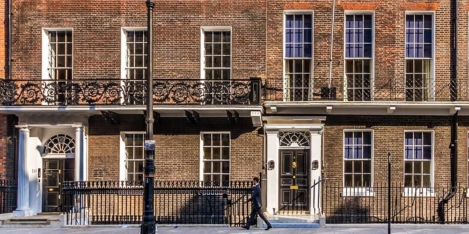November 3, 2017
UK remains the most attractive country for employers and employees
 Despite recent figures indicating that work productivity is down in Britain, the UK remains a highly attractive country for employers and employees based on a combination of talent, location, quality of life and cost, according to the latest edition of Colliers International’s European Cities of Influence report. The analysis of 50 major European economic cities for employers saw London retain its top position, with all other UK cities in the analysis featuring in the top 20 (Birmingham, Edinburgh, Manchester, Bristol and Glasgow).The report finds that quality of life factors are important to accelerate business and attract talent with the research revealing that the nature of workplace strategy is evolving so rapidly that keeping up — let alone staying ahead of the curve — can be a challenge. Employers are now focused on creating a workplace that can attract and retain talent by incorporating co-working and collaborative facilities, flexible working options and ingraining a healthy mindset. With the onus on keeping employees happy and productive, the design and utilization of the workplace is helping to accelerate business productivity more than ever before.
Despite recent figures indicating that work productivity is down in Britain, the UK remains a highly attractive country for employers and employees based on a combination of talent, location, quality of life and cost, according to the latest edition of Colliers International’s European Cities of Influence report. The analysis of 50 major European economic cities for employers saw London retain its top position, with all other UK cities in the analysis featuring in the top 20 (Birmingham, Edinburgh, Manchester, Bristol and Glasgow).The report finds that quality of life factors are important to accelerate business and attract talent with the research revealing that the nature of workplace strategy is evolving so rapidly that keeping up — let alone staying ahead of the curve — can be a challenge. Employers are now focused on creating a workplace that can attract and retain talent by incorporating co-working and collaborative facilities, flexible working options and ingraining a healthy mindset. With the onus on keeping employees happy and productive, the design and utilization of the workplace is helping to accelerate business productivity more than ever before.







 The London office market remains a buoyant market despite Brexit uncertainty, as many organisations see it as the most prestigious location for businesses of any size. In
The London office market remains a buoyant market despite Brexit uncertainty, as many organisations see it as the most prestigious location for businesses of any size. In 
 Businesses are concerned about the pace of commitment to improving the UK’s infrastructure, and a record number of firms are dissatisfied with the state of infrastructure in their region. With the UK currently ranking 27th in the world for the quality of its infrastructure, nearly all (96 percent) of businesses in the 2017 CBI/AECOM Infrastructure Survey see infrastructure as important (of which 55 percent view it as critical) to the Government’s agenda. From the Clean Growth Strategy and the £500 billion infrastructure pipeline to its decision to build a new runway at Heathrow and press ahead with the A303 tunnel, the Government has made clear its commitment to British infrastructure. However, only one in five firms is satisfied with the pace of delivery (20 percent) and almost three quarters (74 percent) doubt infrastructure will improve over this Parliament. This lack of confidence is attributed primarily to policy inconsistency (+94 percent of firms) & political risk (+86 percent). The digital sector is the exception, however, where 59 percent of firms are confident of improvements.
Businesses are concerned about the pace of commitment to improving the UK’s infrastructure, and a record number of firms are dissatisfied with the state of infrastructure in their region. With the UK currently ranking 27th in the world for the quality of its infrastructure, nearly all (96 percent) of businesses in the 2017 CBI/AECOM Infrastructure Survey see infrastructure as important (of which 55 percent view it as critical) to the Government’s agenda. From the Clean Growth Strategy and the £500 billion infrastructure pipeline to its decision to build a new runway at Heathrow and press ahead with the A303 tunnel, the Government has made clear its commitment to British infrastructure. However, only one in five firms is satisfied with the pace of delivery (20 percent) and almost three quarters (74 percent) doubt infrastructure will improve over this Parliament. This lack of confidence is attributed primarily to policy inconsistency (+94 percent of firms) & political risk (+86 percent). The digital sector is the exception, however, where 59 percent of firms are confident of improvements.




 Strong demand and a lack of supply is helping to boast the regional office rental market, according to Savills’ latest Regional Offices Market Watch. The firm anticipates that take-up will reach 9.8 million sq ft (910,450 sq m) by the end of 2017, a 4 percent increase on 2016 and 9 percent up on the 10 year average. This is due to a number of large Government Property Unit (GPU) deals completing in the second half of the year. As a result of strong demand, total availability across the UK fell by 1 percent to 30 million sq ft (2.787 million sq m) in the first half of the year, which equates to just 1.8 years worth of available Grade A supply. What’s more, Savills notes that office based employment across the regional cities is forecast to grow by up to 4.6 percent over the next five years, leading to a net additional 55,000 jobs, representing a need for a further 5 million sq ft (464,616 sq m) of office space.
Strong demand and a lack of supply is helping to boast the regional office rental market, according to Savills’ latest Regional Offices Market Watch. The firm anticipates that take-up will reach 9.8 million sq ft (910,450 sq m) by the end of 2017, a 4 percent increase on 2016 and 9 percent up on the 10 year average. This is due to a number of large Government Property Unit (GPU) deals completing in the second half of the year. As a result of strong demand, total availability across the UK fell by 1 percent to 30 million sq ft (2.787 million sq m) in the first half of the year, which equates to just 1.8 years worth of available Grade A supply. What’s more, Savills notes that office based employment across the regional cities is forecast to grow by up to 4.6 percent over the next five years, leading to a net additional 55,000 jobs, representing a need for a further 5 million sq ft (464,616 sq m) of office space.















